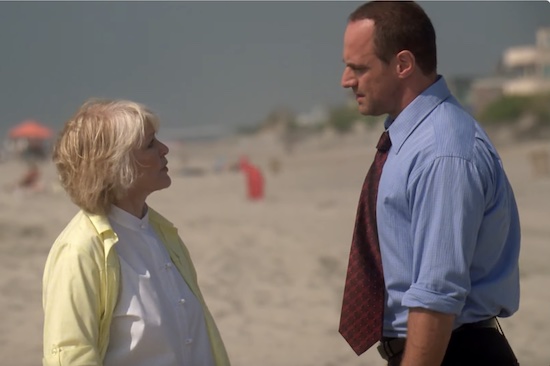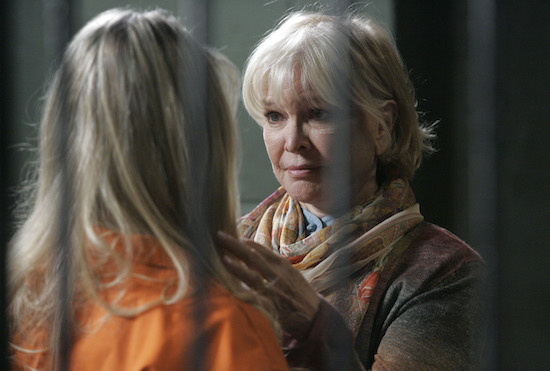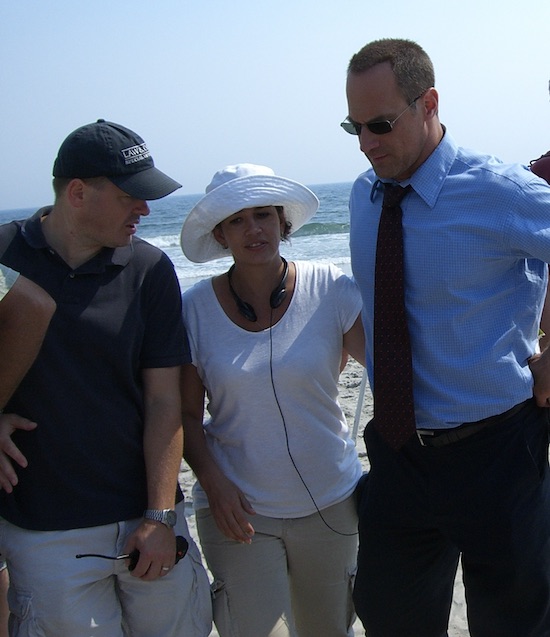LAW & ORDER: SPECIAL VICTIMS UNIT: Amanda Green Looks Back at Writing ‘Swing’ (Part 1)
October 12, 2023 by Marisa Roffman

Ellen Burstyn and Christopher Meloni in “Swing.” (Photo credit: YouTube screengrab/NBC)
For the first nine years of LAW & ORDER: SPECIAL VICTIMS UNIT’s run, Elliot Stabler’s (Christopher Meloni) background had one glaring, obvious absence: His mother.
Viewers frequently saw Stabler with his wife and children in the early seasons, and there were brief mentions of his (long-dead) abusive cop father and his (still-unseen) siblings. But for over 200 episodes, nothing was said about what role, if any, his mom had in his life.
Then, on October 14, 2008, Bernie Stabler (Ellen Burstyn) made her debut in the LAW & ORDER world in the SVU episode “Swing.”
On-screen, the circumstances were terrible—Elliot’s daughter, Kathleen (Allison Siko), was caught breaking into a house, and it quickly became clear this wasn’t reckless behavior or drug-induced acting out: She was mentally unwell and refusing to admit it.
Elliot reluctantly reached out to his mother, Bernie, whom he had been quasi-estranged with due to the Stabler matriarch’s (mostly) untreated bipolar disorder. Though the duo wasn’t able to reconcile, Bernie eventually agreed to meet up with the incarcerated Kathleen—after Bernie was prodded by Elliot’s partner, Olivia Benson (Mariska Hargitay). (Olivia, for her part, was as blindsided by Bernie’s existence as the audience.)
Ultimately, Bernie was able to convince her granddaughter to get help; Bernie noted she had opted to live her life her own way—sans medication—but she had put Elliot’s life at risk multiple times, and it eventually cost her their relationship.
Off-screen, the episode was honored with an Outstanding Guest Actress in a Drama Series Emmy for Burstyn and a Humanitas Prize nomination in the 60 Minute Category for writer Amanda Green. The episode featured some of Meloni’s best work in his dozen years on the series; Green, for her part, brilliantly recontextualized and explained so much of how and why Elliot Stabler was the way he was, giving the character additional heartbreaking depth.
Though Meloni left SVU in 2011, he returned to the LAW & ORDER world with ORGANIZED CRIME in 2021—and Bernie was brought back as a recurring character in OC season 2. (To date, Burstyn has appeared in 13 episodes of OC.)
Now, 15 years after “Swing” aired, Green—who has worked on PERCEPTION, THE MYSTERIES OF LAURA, and MANIFEST since leaving SVU—looks back on the hour and its legacy…
How did you come to work on LAW & ORDER: SVU?
Before I became a television writer, I worked in a real-life SVU in New York City—I worked on the mental health side of things, doing victim-facing work with the DA’s office and the New York City Police Department in sex crimes and crimes against children. [It was a unit] based on putting mental health clinicians hand-in-hand with police and prosecutors to make the experience safer, healthier, and a better legal outcome for victims of sex crimes.
This all happened by accident: When they were scouting the pilot for LAW & ORDER: SVU, a crew showed up at the Special Victims squad in Brooklyn to take reference photos for the set. They asked a bunch of questions, and people kept saying, “Talk to Amanda.” I spoke to somebody…but I gave them my business card, because it was the ’90s. A [few days later], my beeper went off and it was a writer on the Universal lot, who’s like, “We got your name from the people in New York. Can we talk to you? Can we ask you some questions?” And they did.
Then a week later, they called me back and said, “Mariska Hargitay wants to go on a ride-along—could you take her out?” And I did. Mariska and I got on great. And then she said, “You have to come to my set, you have to see if we are doing this right.” And so I went out to the swamps of East Bergen, New Jersey, and was standing there on the soundstage, and Mariska grabbed me by the arm—if you know Mariska, the Mariska grab is a thing; she grabs your upper arm, it’s her passion, it’s her exuberance—and she said, “Oh my God, you have to come with me” because Dick Wolf was there…she dragged me down that hallway, and her words—I will never forget them—were, “Dick, you have to meet the real-life Olivia Benson.”
And that moment, that grab, changed the course of my life. I was only in it, up until that moment, for a couple of free lunches. I was going through a divorce. I didn’t own a television set. I was a reader and a writer, but not as an aspirational television writer. I really knew nothing about the business. Certainly, the only time I’d ever been on a set was that day. And Dick said, “Come to my office, talk to me.” I didn’t know who Dick Wolf was; I watched LAW & ORDER, it was ubiquitous, but I hadn’t ever thought about it. And so he asked me some things and I just told the man what I thought.
A week later, I’m in my office in Brooklyn, and the phone rings and it’s Dick’s secretary saying, “Dick would like you to come to LA tomorrow and talk to the writers.” And I said, “Are you f—ing kidding me? I’m in the middle of a homicide investigation.” [Laughs.] And she was like, “Oh. Okay.” She called me back a couple hours later and said, “When would you be available to come to LA to talk to the writers?” And that was the start of what became my Hollywood career.
It was crazy and fortuitous. I kept technical advising them for the first two seasons, but [becoming a full-time writer] was after Neal Baer took over [as showrunner in season 2]; Neal had basically the same backstory as I did: Medical student who got back into writing with ER because he had the knowledge of medicine that the show needed.
Mariska, Dick, and that meeting started it all, but Neal’s the one who gave me a career; he knew from his experience what it meant to have someone who lived and breathed the reality of what we were writing about. And I didn’t choose to be a writer, they chose for me. They said, “Enough already, stop technical advising, move to LA, be a writer.” It’s insane, knowing what I now know about our business, and how hard it is to break in.
Of your 30 credited episodes, you wrote several big Stabler-centric hours. (Including “Shaken,” “Demons,” “Annihilated,” “Paternity,” and “Solitary.”) What led to you taking on so many installments that focused on him?
I think it was two things. One, I get along with Chris…Chris and I had a connection that was really healthy for us, and we evolved a lot of trust over time. I think he let me in enough to his process that I could understand what he needed.
But I also think, and this is the more important part, I was never a cop; I was never Olivia Benson. But the victim-forward, empathy-centered, more therapeutic approach to victims that the Olivia Benson character takes—I had lived in that space as a mental health professional in the criminal justice system. The way that character interacted with victims was very familiar to me.
So writing Elliot Stabler—head-knocker, door-slammer, aggro male, brimming with rage—I had to reach into the character more and question myself more as a writer to not write too close to home. I enjoy writing for Mariska, and I enjoy Mariska as a human being, but I think where some of Benson’s material would have been more second nature to me, I was more curious about what was inside a character that was totally unlike me.

LAW & ORDER: SPECIAL VICTIMS UNIT “Swing” (Photo credit: NBC.)
“Swing” is a very different kind of episode for SVU—there’s a case, but the Stabler family really is at the core of the hour. What do you recall about how it came to be?
So often on SVU, we had an open door to a terrific actor, and we crafted for them. And I don’t remember whether it was “Ellen Burstyn would consider SVU, what have you got for her?”—which was the case with a lot of people; I did that with Miss Cicely Tyson, Brenda Blethyn, and Stephen Rea, where I met with the actors before writing the part and heard what their parameters or thoughts were.
But Neal Baer’s reach into just the acting community, and Jonathan Strauss, our casting director—between the two of them, we were getting access to wonderful people. Remember, at the time, [there was the industry mindset of,] “Real actors didn’t do TV.” We were not in Peak TV back then. [Laughs.] Like, “Oh, you’re a writer? Oh, you write for TV. I don’t watch TV. I don’t own a TV. Haven’t you written a feature? You’re not really a writer.”
I don’t remember whether it was [we knew] Ellen Burstyn was interested first or the idea first, but what I vividly remember is wanting to answer the question: Where is Elliot Stabler’s mother? And why have we never heard her name? Why has he never referenced [her]? We heard about his father—his dad was a cop. We all knew that. There was this invisibility of a mother [for Elliot], to not even know if she was alive or dead or what role [she played in his life].
I’m always intrigued by characters’ personal psychology, histories, and traumas. And that’s where I approach writing from. But at the time—and I don’t know if this was conscious, but I look at it and it’s quite clear to me in retrospect—I was a new mother then. My first kid was born in 2007 and wasn’t quite a year old when I met with Ellen Burstyn.
The day I sat down with Ellen at Shutters on the Beach for a conversation to see if she would be willing to basically read the script and say yes—before it was even written—my husband and I had to drive out there together so that the baby could be nearby, so the minute that meeting with Ellen was over, I could breastfeed. And I remember sitting there on this outside patio with Ellen, trying not to be distracted by the fact that ten feet to my left on the sidewalk is my husband walking up and down with my infant. [Laughs.]
This was in the ice age, so we didn’t have maternity leave; I didn’t know many women who were negotiating motherhood in Hollywood. We were just supposed to pretend it didn’t happen. So I don’t know if that was in my mind then, or if it just came out in the writing as so much of our own personal struggles do. But how could this family man, Elliot Stabler, who I think said in almost every episode, “I have children!”—what was this void?
Is there anything you remember about that initial conversation with Ellen?
I do not remember much. But I remember one thing vividly, and it’s funny…when I went back to read the script again in preparation for [this interview], I realized, “Oh my God, it’s in the script!”
She intimidated the f— out of me. She’s an amazing actor, legendary, and her craft is phenomenal. But she’s also an incredibly smart woman who thinks deeply and critically about life and emotion and accountability. I don’t remember how it came up, but at one point she made it very, very clear to me that she lives her personal life by taking ownership of her own emotions. And I remember this moment—whether I said something or she was explaining—and she said what she hates is someone saying, “You made me feel bad.” And she said, “No, that’s not how it works. People don’t make other people feel [things]; they are your feelings. That is your choice.”
I don’t remember, again, if I said something and she was schooling me or if she just offered this up in the discussion, but it was incredibly important to her, as a human being, to not project blame or emotions and feelings onto another person. I remember that moment; I remember the fire, in a positive way, and the energy with which she was explaining this philosophy or guiding principle.
And then when I’m reading the script, I’m like, “Oh, my God, look, there’s a moment where she actually says that to Kathleen…well, clearly, I was writing to Ellen in that moment.” [Laughs.] It made an impact.
Kathleen had been struggling for years before her diagnosis in “Swing.” Did the writers know she was ill, or was that something you realized fit when you started crafting this episode?
I think it started off wanting to talk about the mental health [element] before it was “What if it was Kathleen?” My whole philosophy, always and forever, was that SVU was a door. The crime was a door to get us into a world and talk about an issue or a problem or something that we were all struggling with. And I don’t really remember the flow of it, but I know there were so many moments in SVU history where we were like, “How do we get there? How do we make this an SVU show? How do we make this really resonate?” And it would have been not out of character for that [story genesis] to start from a place of, “But what if it wasn’t just a girl? What if it was [Kathleen]?”
Elliot and Bernie’s reunion is extraordinary for a number of reasons, but one is that the sequence of the two of them talking is over eight minutes long—
I know! How the f— did that happen?!
From what you remember, what was the process of getting that approved? That amount of time devoted to two characters talking is still rare to have on network television, let alone a procedural…
There was nowhere near as rigorous a level of script approval back then. It was just a different world than the algorithm-run committee of fear that governs most production now; there was trust earned over hundreds of hours of storytelling. “Swing” was well past episode 200. We were trusted to do what we needed to do. We got two types of notes: Network notes and Standards & Practices notes. We had amazing, amazing support from Bruce Evans when he was our current exec at NBC. His notes would always be about clarity. And Standards & Practices had a lot of trust in our integrity as well. Their notes were usually, “Utilize your usual taste and discretion as you show this sex act or describe this horrible traumatic event.” We really were left alone to tell the stories we wanted to tell.
What was it like actually writing that reunion?
This is my happy place as a writer, writing that kind of material. I can do procedural beats ‘til the cows keel over and die in the pasture…but for me, it’s those deeper moments.
And, of course, it wasn’t the formula. But when you have a big stick—in this case, Ellen Burstyn—you can push the envelope. [You can say] Ellen Burstyn’s not going to do the show unless her character has meat. And I don’t recall at any point, anyone saying, “You can’t do this.” You have an Academy Award-winning actress and you’ve got a moment people are waiting for. It was ten seasons into the show. And we were unpacking more about this man than we’ve ever known.
I can’t even imagine writing for a ten-season show anymore, let alone [the fact] SVU is still going strong. We don’t get that as writers, that very special episode somewhere deep in an order—you don’t get to do that anymore. And I think that’s what 200-plus episodes buys you, even in a format like SVU.
I think it was helped that it came after Mariska’s Emmy [win], which was for a similar format-busting episode where she never left [the precinct] on a 911 call [in “911”]. That probably also played some part: we had shown that when you’ve respected the format for 200 episodes, the occasional format-buster could not only succeed, but resonate. So I would give that one a lot of credit, too.

1st AD Ken Brown, Green, and Meloni on the set of “Swing.” (Photo courtesy of Green.)
What do you remember about any possible conversations with Ellen and Chris about what is revealed in those scenes and what you wanted to get out of that dynamic?
Honestly, we didn’t have to talk much about it; they had the material. It was very intimate—as intimate as stuff is when you’re filming in front of 150 crew. These are two people of phenomenal craft, who knew how to take what was on the page and make it their own. I don’t remember any need to have a specific [conversation] of, “Here’s what you do now.”
What was it like watching them film together?
It was amazing. The two of them had a magic bubble, which you see sometimes when you see two actors who are well-balanced and able to play with the material. Even though the material in this case was incredibly painful, they were just magic together.
Chris is an actor who is driven by his deep knowledge of Stabler as a character and his awareness of what he can do with his craft. Sitting and doing script notes with Chris, he’d often ask me to cut a line, saying, “I don’t need to say that, I’ll act that.” Music to my ears. I trusted him completely so my answer would always be, “Yep, cut, gone.” I genuinely love working with Chris. And I love writing for him because it was a true collaboration. So many times I sat in Chris’ dressing room, and he would go, “Why am I saying this? I don’t get it.” And what working with Chris taught me was that if I had to fight too hard to explain why a line or thing was important, I was probably wrong. But when I could just simply say, “Here’s why, Chris,” and let him sit with the line or the idea and process it from his own understanding and inside knowledge of the character, he would go someplace extraordinary.
And I just think that the combination of these two amazingly talented people just created magic. So who knows? I might have given a note here or there. I don’t want to say I did, because in my memory of it, that’s not present.
Watching them, this is the dream, right? As a writer, yes, it starts in your head and on your computer screen, but the hope is every single person who touches it—whether it’s set dec or costume or props or cinematography and the lighting—adds their own special sauce. And certainly no more so than the actor. And sometimes it just works; I think they just worked. And clearly, they’re continuing to [on ORGANIZED CRIME], which, God bless, is awesome.
Click here for part 2, as Green reflects on Elliot’s complex relationships, the end of “Swing,” a very memorable filming experience with Burstyn, and more.
This interview has been condensed and edited for clarity.
RELATED:
- LAW & ORDER: SPECIAL VICTIMS UNIT Season 24 Finale Recap: ‘All Pain Is One Malady’
- LAW & ORDER: SPECIAL VICTIMS UNIT Season 24 Finale: ‘All Pain Is One Malady’ Photos
- LAW & ORDER: SPECIAL VICTIMS UNIT’s Octavio Pisano Previews Velasco’s Team-Up with ORGANIZED CRIME’s Reyes
- LAW & ORDER: SPECIAL VICTIMS UNIT Recap: Carisi Spills a Secret, Benson and Stabler Reunite, and Muncy Gets a Win
- LAW & ORDER: SPECIAL VICTIMS UNIT: ‘Bad Things’ Photos
- 3 Teases for LAW & ORDER, SVU, and ORGANIZED CRIME
- LAW & ORDER: SPECIAL VICTIMS UNIT: ‘Debatable’ Photos
- LAW & ORDER: SPECIAL VICTIMS UNIT and ORGANIZED CRIME Set Three-Episode Crossover Finale Arc
- LAW & ORDER: SPECIAL VICTIMS UNIT Post-Mortem: Octavio Pisano on Velasco’s Big Decision and Proving His Loyalty to Benson
- LAW & ORDER: SPECIAL VICTIMS UNIT: Octavio Pisano Previews Velasco’s Reunion with Chilly
- NBC Renews LAW & ORDER, SVU, ORGANIZED CRIME, and ONE CHICAGO Trio
- LAW & ORDER: SPECIAL VICTIMS UNIT Scoop: A Case Hits Close to Home for Maxwell
- LAW & ORDER: SPECIAL VICTIMS UNIT Recap: What Secret Was Velasco Hiding?
- LAW & ORDER: SPECIAL VICTIMS UNIT: ‘King of the Moon’ Photos
- LAW & ORDER: SPECIAL VICTIMS UNIT: Mariska Hargitay Shares BTS Photos From ‘King of the Moon’
- The LAW & ORDER: SPECIAL VICTIMS UNIT Team Pays Tribute to Richard Belzer
- Cady McClain Dishes on Returning to LAW & ORDER: SPECIAL VICTIMS UNIT and DAYS OF OUR LIVES
- LAW & ORDER: SPECIAL VICTIMS UNIT Post-Mortem: Maurice Compte on Duarte and Olivia’s Different Approaches to Taking Down BX9
- LAW & ORDER: SPECIAL VICTIMS UNIT: Maurice Compte Previews Duarte’s Return to Take on BX9
- LAW & ORDER: SPECIAL VICTIMS UNIT: Octavio Pisano Teases Barba’s Return and an Unexpectedly Personal Scene Between Velasco and Carisi
- LAW & ORDER: SPECIAL VICTIMS UNIT: Pratibha Parmar on the ‘Real Gift’ of Making Her Network TV Directorial Debut with ‘Did You Believe in Miracles?’
- LAW & ORDER Stars Mariska Hargitay and Christopher Meloni Weigh in on a Potential Benson/Stabler Relationship: ‘It Just Has to be Earned’
- LAW & ORDER: SPECIAL VICTIMS UNIT: Warren Leight Explains the Cut Crossover Diner Scene
- LAW & ORDER: SVU and ORGANIZED CRIME: Mariska Hargitay and Christopher Meloni Break Down Olivia and Elliot’s Messy Reunion
Follow @GiveMeMyRemote and @marisaroffman on Twitter for the latest TV news. Connect with other TV fans on GIVE ME MY REMOTE’s official Facebook page or our Instagram.
And be the first to see our exclusive videos by subscribing to our YouTube channel.
As an Amazon Associate we earn from qualifying purchases made through links/ads placed on the site.
Related Posts
Filed under SVU
Comments Off on LAW & ORDER: SPECIAL VICTIMS UNIT: Amanda Green Looks Back at Writing ‘Swing’ (Part 1)



Comments